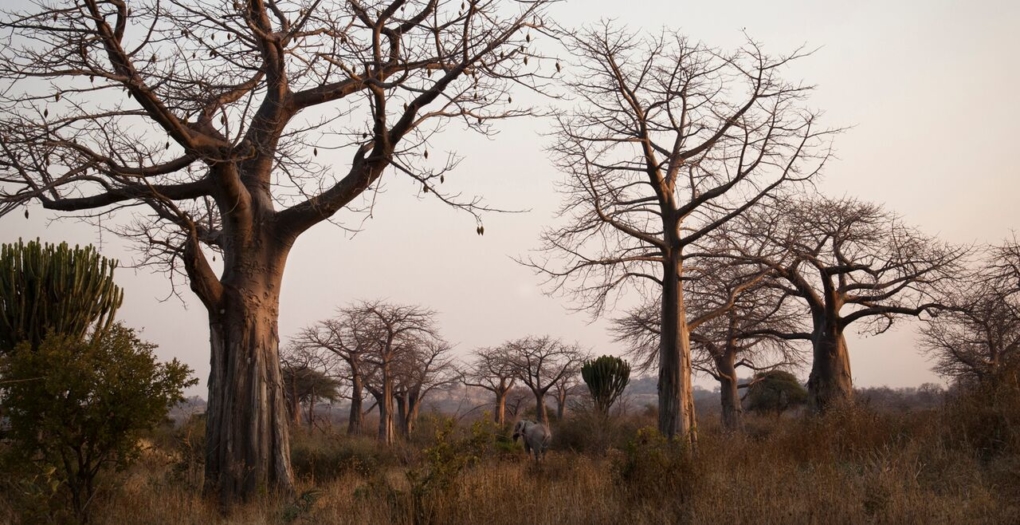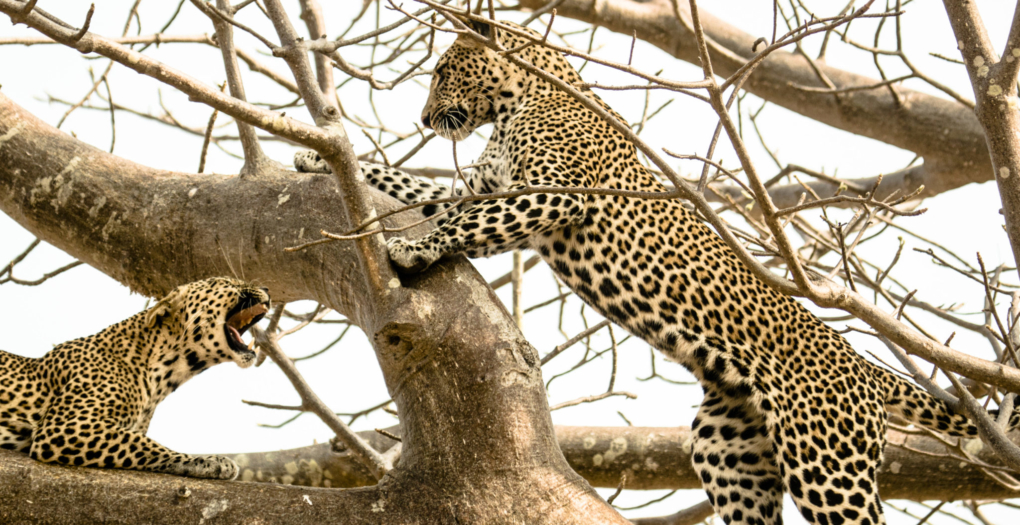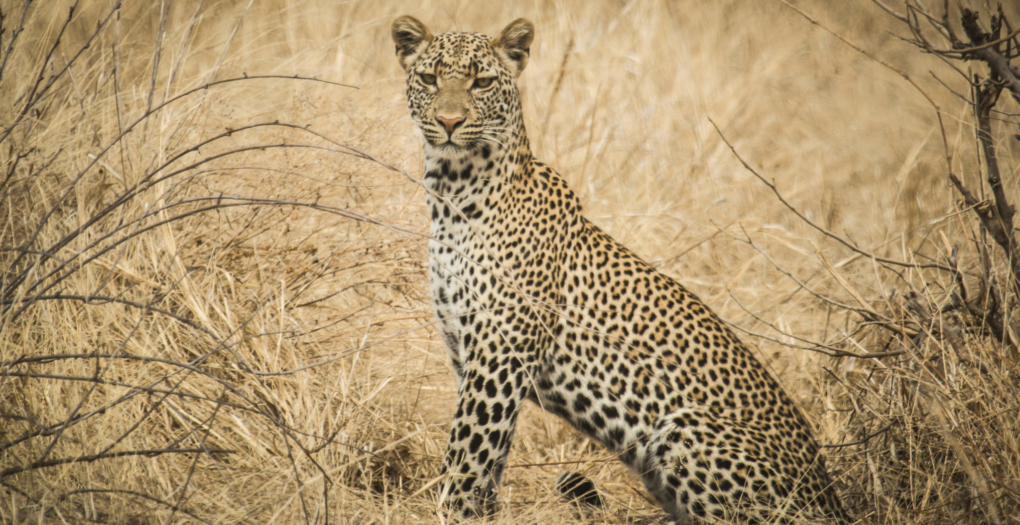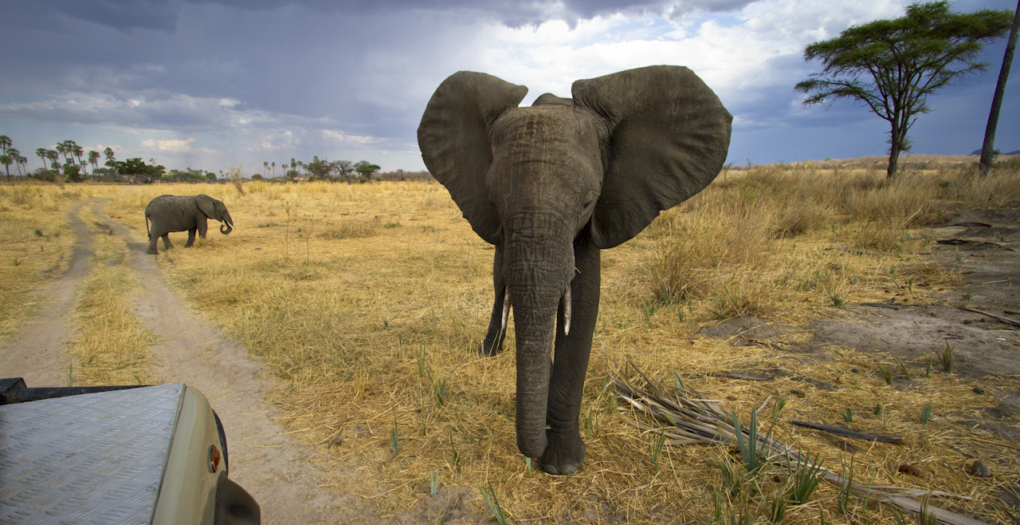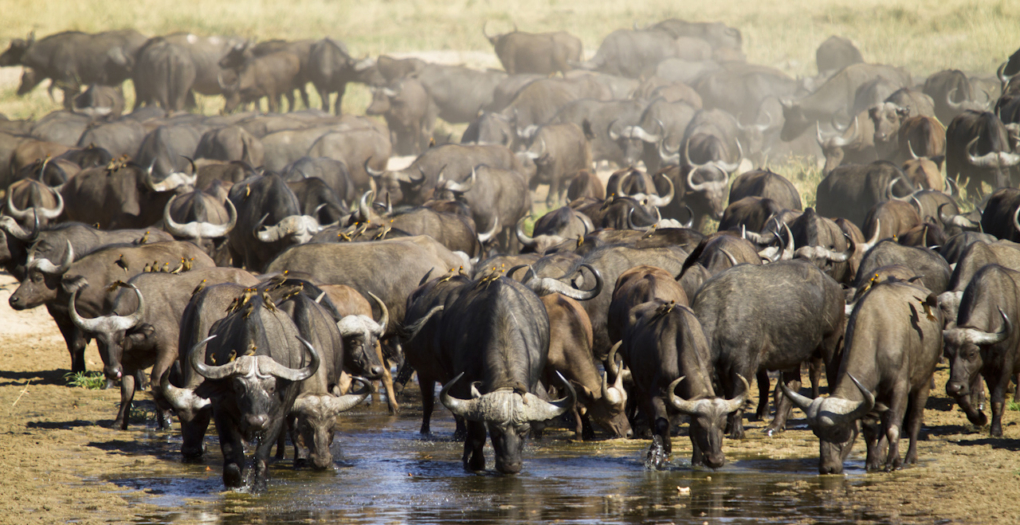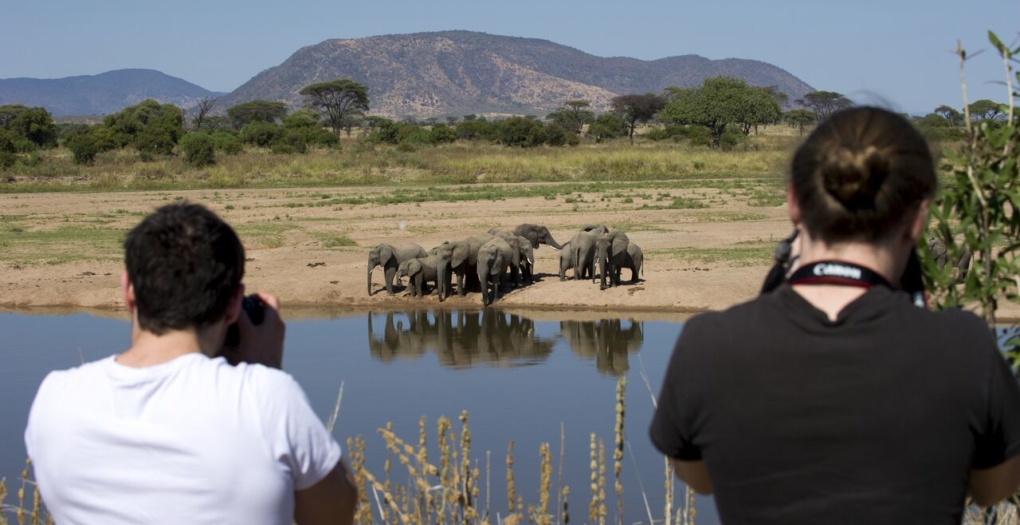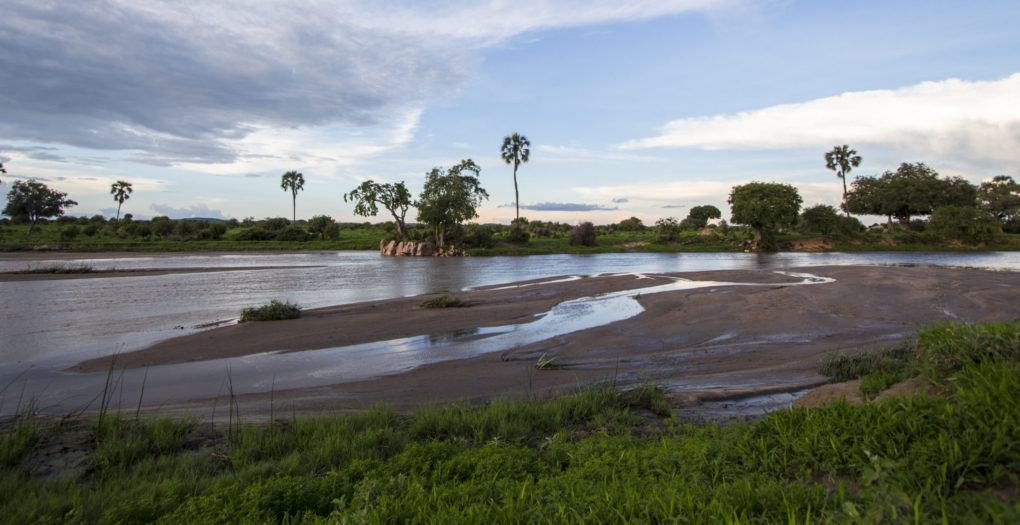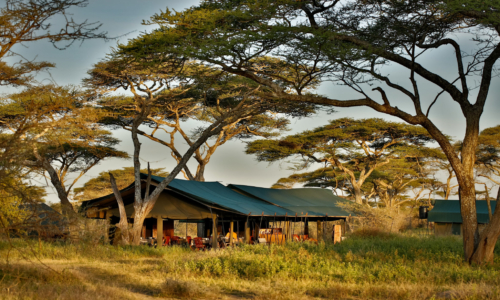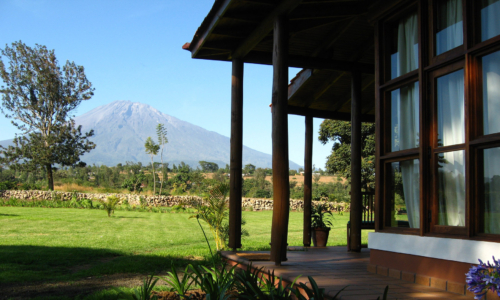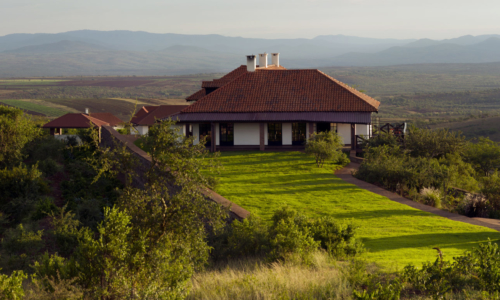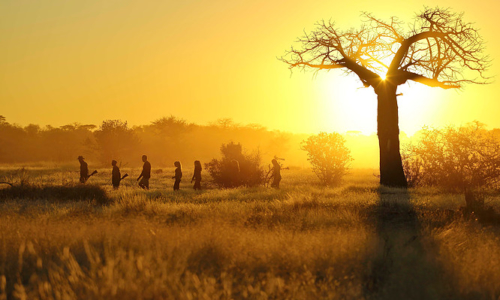Southern Tanzania’s Ruaha National Park is known for its rich and diverse wildlife, which includes a particularly impressive elephant population. Ruaha is the largest national park in Tanzania and East Africa, spanning over about 25,000-square miles. With low numbers of tourists each year, Ruaha is the ideal place to explore the wonders of Africa in virtual seclusion. The diverse landscape here ranges from baobab trees and granite kopjes to open plains with cooling rivers and woodland valleys. The mountains in the south and west reach as high as 6.000 feet. But the heart of the park is the great Ruaha River that flows east into the Rufiji River and where a lot of the wildlife can be spotted. There are also other sand rivers that disappear during the dry season.
Besides having elephants numbering in the 12,000, a tenth of the world’s lion population lives in Ruaha and prides of 20 or more are commonplace. Sightings of herds of greater and lesser kudu, sable and roan antelope are frequent, as are glimpses of the third highest population of endangered African wild dog, bat-eared fox and cheetah. The elusive leopard can be spotted lurking in the bushes. Coming out to play at night, the diverse nocturnal wildlife here includes genet, white tailed mongoose, bat-eared foxes, hyena, lion, and rare aardwolf.
The park is one of the Tanzania birds’ paradise with more than 571 species recorded here including hornbills, darters, Great white pelican, grey heron, yellow-billed egret, ibis, secretary bird, Egyptian vulture, and more. Apart from its large animals, the park also has a number of reptiles and amphibians such as crocodiles, poisonous and non-poisonous snakes, monitor lizards, agama lizards, and frogs.
With such a diverse population of wildlife to view, the activities in Ruaha focus on the game drives. Nearby safari camps and lodges offer traditional game drives led by trained guides and trackers in heavy-duty 4×4 vehicles. Due to the low numbers of tourists, the game vehicles often don’t see other vehicles and don’t have to compete for space like in other more popular parks. Walking safari are led by an armed park ranger who carefully explains the wonders of some of the park’s smaller creatures and plant life. Night drives discover the nocturnal doings of many creatures with the aid of a spotlight. With so many bird migrating to the area, bird watching is a popular pastime here. Many lodges set up fly camps with nothing separating the visitors from the wildlife except for a small tent and an armed guard keeping watch. Picnics and sundowners are enjoyed on the banks of the rivers as travelers watch elephants bathe or pods of hippos play.

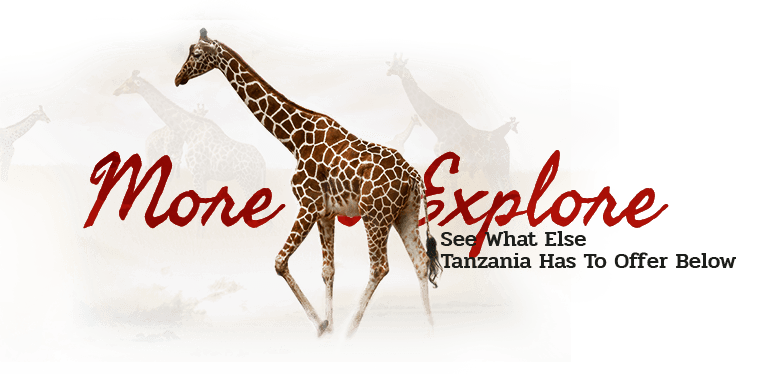
- Bashay Rift Lodge
- Beho Beho Camp
- Chada Katavi
- Chaka Camp
- Chem Chem Lodge
- Dunia Camp
- Entamanu Ngorongoro
- Entamanu Private
- Esirai Camp
- Ewanjan Tented Camp
- Faru Faru Lodge
- Forest Chem Chem
- Fumba Beach Lodge
- Fundu Lagoon
- Gibb’s Farm
- Greystoke Mahale
- Grumeti Hills
- Grumeti Serengeti River Lodge
- Ikuka Safari Camp
- Jabali Ridge
- Jongomero
- Kaskaz Mara Camp
- Kiba Point Selous
- Kichaka
- Kichakani Serengeti Camp
- Kichuguu Camp
- Kigelia Ruaha
- Kilima
- Kiota Camp
- Kisima Ngeda Camp
- Kitela Lodge
- Klein’s Camp
- Kokoko Camp
- Kuria Hills Lodge
- Kuro Tarangire
- Kusini Kopjes Kambi
- Kusini Serengeti
- Kwihala Camp
- Lake Manyara Tree Lodge
- Lamai Serengeti
- Little Chem Chem
- Little Oliver’s Camp
- Manyara Ranch Conservancy
- Mara River Post
- Mara River Tented Camp
- Mara Tented Camp
- Maweninga Camp
- Melia Ngorongoro
- Mila Tented Camp
- Milele
- Mkombe’s House
- Mnemba Island
- Mpingo Ridge Lodge
- Mwiba Lodge
- Namiri Plains
- Naona Moru Camp
- Nasikia Mobile Camp
- Ndutu Safari Lodge
- Ndutu Tented Camp
- Ngorongoro Crater Camp
- Ngorongoro Crater Lodge
- Ngorongoro Serena Safari Lodge
- Ngorongoro Sopa Lodge
- Ngorongoro Tented Camp
- Nomad Expeditionary Walking Camp
- Nyasi Tented Camp
- Olaado Camp
- Olakira Migration Camp
- Olduvai Camp
- Olduvai Ndogo
- Oliver’s Camp
- Olkeri Camp
- Olmara Camp
- Roho ya Selous
- Ronjo Camp
- Rubondo Island Camp
- Sabora Tented Camp
- Sanctuary Serengeti Migration Camp
- Sand Rivers Selous
- Sasakwa Lodge
- Sayari Camp
- Selous Serena Camp
- Serena Mivumo River Lodge
- Serengeti Bushtops
- Serengeti House
- Serengeti Kati Kati Tented Camp
- Serengeti Migration Camp
- Serengeti Pioneer Camp
- Serengeti Safari Camp
- Serengeti Under Canvas
- Serian’s Serengeti
- Serian’s Serengeti Mobile
- Singita Explore
- Singita Kilima
- Siwandu
- Songa Migrational Camp
- Swala
- Taasa Lodge
- Tarangire Ndovu Tented Lodge
- Tarangire Safari Lodge
- Tarangire Sopa Lodge
- Tarangire Treetops
- The Highlands
- The Manor at Ngorongoro
- Ubuntu Migration Camp
- Usangu Expedition Camp
- Usawa Serengeti
- Arumeru Lodge
- Arusha Coffee Lodge
- Baraza Resort & Spa
- Breezes Beach Club & Spa
- Chole Mjini
- Dar es Salaam Serena Hotel
- Fanjove Island
- Hamerkop House
- Katambuga House
- Kilindi Zanzibar
- Lake Duluti Lodge
- Legendary Lodge
- Matemwe Beach House
- Matemwe Lodge
- Matemwe Retreat
- Ngare Sero Mountain Lodge
- Oyster Bay Hotel
- Plantation Lodge
- Rivertrees Country Inn
- The Palms
- Zanzibar Serena Hotel
- Zawadi Hotel
- Zuri Zanzibar
Coming soon!
- Bashay Rift Lodge
- Beho Beho Camp
- Chada Katavi
- Chaka Camp
- Chem Chem Lodge
- Dunia Camp
- Entamanu Ngorongoro
- Entamanu Private
- Esirai Camp
- Ewanjan Tented Camp
- Faru Faru Lodge
- Forest Chem Chem
- Fumba Beach Lodge
- Fundu Lagoon
- Gibb’s Farm
- Greystoke Mahale
- Grumeti Hills
- Grumeti Serengeti River Lodge
- Ikuka Safari Camp
- Jabali Ridge
- Jongomero
- Kaskaz Mara Camp
- Kiba Point Selous
- Kichaka
- Kichakani Serengeti Camp
- Kichuguu Camp
- Kigelia Ruaha
- Kilima
- Kiota Camp
- Kisima Ngeda Camp
- Kitela Lodge
- Klein’s Camp
- Kokoko Camp
- Kuria Hills Lodge
- Kuro Tarangire
- Kusini Kopjes Kambi
- Kusini Serengeti
- Kwihala Camp
- Lake Manyara Tree Lodge
- Lamai Serengeti
- Little Chem Chem
- Little Oliver’s Camp
- Manyara Ranch Conservancy
- Mara River Post
- Mara River Tented Camp
- Mara Tented Camp
- Maweninga Camp
- Melia Ngorongoro
- Mila Tented Camp
- Milele
- Mkombe’s House
- Mnemba Island
- Mpingo Ridge Lodge
- Mwiba Lodge
- Namiri Plains
- Naona Moru Camp
- Nasikia Mobile Camp
- Ndutu Safari Lodge
- Ndutu Tented Camp
- Ngorongoro Crater Camp
- Ngorongoro Crater Lodge
- Ngorongoro Serena Safari Lodge
- Ngorongoro Sopa Lodge
- Ngorongoro Tented Camp
- Nomad Expeditionary Walking Camp
- Nyasi Tented Camp
- Olaado Camp
- Olakira Migration Camp
- Olduvai Camp
- Olduvai Ndogo
- Oliver’s Camp
- Olkeri Camp
- Olmara Camp
- Roho ya Selous
- Ronjo Camp
- Rubondo Island Camp
- Sabora Tented Camp
- Sanctuary Serengeti Migration Camp
- Sand Rivers Selous
- Sasakwa Lodge
- Sayari Camp
- Selous Serena Camp
- Serena Mivumo River Lodge
- Serengeti Bushtops
- Serengeti House
- Serengeti Kati Kati Tented Camp
- Serengeti Migration Camp
- Serengeti Pioneer Camp
- Serengeti Safari Camp
- Serengeti Under Canvas
- Serian’s Serengeti
- Serian’s Serengeti Mobile
- Singita Explore
- Singita Kilima
- Siwandu
- Songa Migrational Camp
- Swala
- Taasa Lodge
- Tarangire Ndovu Tented Lodge
- Tarangire Safari Lodge
- Tarangire Sopa Lodge
- Tarangire Treetops
- The Highlands
- The Manor at Ngorongoro
- Ubuntu Migration Camp
- Usangu Expedition Camp
- Usawa Serengeti
- Arumeru Lodge
- Arusha Coffee Lodge
- Baraza Resort & Spa
- Breezes Beach Club & Spa
- Chole Mjini
- Dar es Salaam Serena Hotel
- Fanjove Island
- Hamerkop House
- Katambuga House
- Kilindi Zanzibar
- Lake Duluti Lodge
- Legendary Lodge
- Matemwe Beach House
- Matemwe Lodge
- Matemwe Retreat
- Ngare Sero Mountain Lodge
- Oyster Bay Hotel
- Plantation Lodge
- Rivertrees Country Inn
- The Palms
- Zanzibar Serena Hotel
- Zawadi Hotel
- Zuri Zanzibar
Coming soon!

Southern Tanzania’s Ruaha National Park is known for its rich and diverse wildlife, which includes a particularly impressive elephant population. Ruaha is the largest national park in Tanzania and East Africa, spanning over about 25,000-square miles. With low numbers of tourists each year, Ruaha is the ideal place to explore the wonders of Africa in virtual seclusion. The diverse landscape here ranges from baobab trees and granite kopjes to open plains with cooling rivers and woodland valleys. The mountains in the south and west reach as high as 6.000 feet. But the heart of the park is the great Ruaha River that flows east into the Rufiji River and where a lot of the wildlife can be spotted. There are also other sand rivers that disappear during the dry season.
Besides having elephants numbering in the 12,000, a tenth of the world’s lion population lives in Ruaha and prides of 20 or more are commonplace. Sightings of herds of greater and lesser kudu, sable and roan antelope are frequent, as are glimpses of the third highest population of endangered African wild dog, bat-eared fox and cheetah. The elusive leopard can be spotted lurking in the bushes. Coming out to play at night, the diverse nocturnal wildlife here includes genet, white tailed mongoose, bat-eared foxes, hyena, lion, and rare aardwolf.
The park is one of the Tanzania birds’ paradise with more than 571 species recorded here including hornbills, darters, Great white pelican, grey heron, yellow-billed egret, ibis, secretary bird, Egyptian vulture, and more. Apart from its large animals, the park also has a number of reptiles and amphibians such as crocodiles, poisonous and non-poisonous snakes, monitor lizards, agama lizards, and frogs.
With such a diverse population of wildlife to view, the activities in Ruaha focus on the game drives. Nearby safari camps and lodges offer traditional game drives led by trained guides and trackers in heavy-duty 4×4 vehicles. Due to the low numbers of tourists, the game vehicles often don’t see other vehicles and don’t have to compete for space like in other more popular parks. Walking safari are led by an armed park ranger who carefully explains the wonders of some of the park’s smaller creatures and plant life. Night drives discover the nocturnal doings of many creatures with the aid of a spotlight. With so many bird migrating to the area, bird watching is a popular pastime here. Many lodges set up fly camps with nothing separating the visitors from the wildlife except for a small tent and an armed guard keeping watch. Picnics and sundowners are enjoyed on the banks of the rivers as travelers watch elephants bathe or pods of hippos play.

- Bashay Rift Lodge
- Beho Beho Camp
- Chada Katavi
- Chaka Camp
- Chem Chem Lodge
- Dunia Camp
- Entamanu Ngorongoro
- Entamanu Private
- Esirai Camp
- Ewanjan Tented Camp
- Faru Faru Lodge
- Forest Chem Chem
- Fumba Beach Lodge
- Fundu Lagoon
- Gibb’s Farm
- Greystoke Mahale
- Grumeti Hills
- Grumeti Serengeti River Lodge
- Ikuka Safari Camp
- Jabali Ridge
- Jongomero
- Kaskaz Mara Camp
- Kiba Point Selous
- Kichaka
- Kichakani Serengeti Camp
- Kichuguu Camp
- Kigelia Ruaha
- Kilima
- Kiota Camp
- Kisima Ngeda Camp
- Kitela Lodge
- Klein’s Camp
- Kokoko Camp
- Kuria Hills Lodge
- Kuro Tarangire
- Kusini Kopjes Kambi
- Kusini Serengeti
- Kwihala Camp
- Lake Manyara Tree Lodge
- Lamai Serengeti
- Little Chem Chem
- Little Oliver’s Camp
- Manyara Ranch Conservancy
- Mara River Post
- Mara River Tented Camp
- Mara Tented Camp
- Maweninga Camp
- Melia Ngorongoro
- Mila Tented Camp
- Milele
- Mkombe’s House
- Mnemba Island
- Mpingo Ridge Lodge
- Mwiba Lodge
- Namiri Plains
- Naona Moru Camp
- Nasikia Mobile Camp
- Ndutu Safari Lodge
- Ndutu Tented Camp
- Ngorongoro Crater Camp
- Ngorongoro Crater Lodge
- Ngorongoro Serena Safari Lodge
- Ngorongoro Sopa Lodge
- Ngorongoro Tented Camp
- Nomad Expeditionary Walking Camp
- Nyasi Tented Camp
- Olaado Camp
- Olakira Migration Camp
- Olduvai Camp
- Olduvai Ndogo
- Oliver’s Camp
- Olkeri Camp
- Olmara Camp
- Roho ya Selous
- Ronjo Camp
- Rubondo Island Camp
- Sabora Tented Camp
- Sanctuary Serengeti Migration Camp
- Sand Rivers Selous
- Sasakwa Lodge
- Sayari Camp
- Selous Serena Camp
- Serena Mivumo River Lodge
- Serengeti Bushtops
- Serengeti House
- Serengeti Kati Kati Tented Camp
- Serengeti Migration Camp
- Serengeti Pioneer Camp
- Serengeti Safari Camp
- Serengeti Under Canvas
- Serian’s Serengeti
- Serian’s Serengeti Mobile
- Singita Explore
- Singita Kilima
- Siwandu
- Songa Migrational Camp
- Swala
- Taasa Lodge
- Tarangire Ndovu Tented Lodge
- Tarangire Safari Lodge
- Tarangire Sopa Lodge
- Tarangire Treetops
- The Highlands
- The Manor at Ngorongoro
- Ubuntu Migration Camp
- Usangu Expedition Camp
- Usawa Serengeti
- Arumeru Lodge
- Arusha Coffee Lodge
- Baraza Resort & Spa
- Breezes Beach Club & Spa
- Chole Mjini
- Dar es Salaam Serena Hotel
- Fanjove Island
- Hamerkop House
- Katambuga House
- Kilindi Zanzibar
- Lake Duluti Lodge
- Legendary Lodge
- Matemwe Beach House
- Matemwe Lodge
- Matemwe Retreat
- Ngare Sero Mountain Lodge
- Oyster Bay Hotel
- Plantation Lodge
- Rivertrees Country Inn
- The Palms
- Zanzibar Serena Hotel
- Zawadi Hotel
- Zuri Zanzibar
Coming soon!
- Bashay Rift Lodge
- Beho Beho Camp
- Chada Katavi
- Chaka Camp
- Chem Chem Lodge
- Dunia Camp
- Entamanu Ngorongoro
- Entamanu Private
- Esirai Camp
- Ewanjan Tented Camp
- Faru Faru Lodge
- Forest Chem Chem
- Fumba Beach Lodge
- Fundu Lagoon
- Gibb’s Farm
- Greystoke Mahale
- Grumeti Hills
- Grumeti Serengeti River Lodge
- Ikuka Safari Camp
- Jabali Ridge
- Jongomero
- Kaskaz Mara Camp
- Kiba Point Selous
- Kichaka
- Kichakani Serengeti Camp
- Kichuguu Camp
- Kigelia Ruaha
- Kilima
- Kiota Camp
- Kisima Ngeda Camp
- Kitela Lodge
- Klein’s Camp
- Kokoko Camp
- Kuria Hills Lodge
- Kuro Tarangire
- Kusini Kopjes Kambi
- Kusini Serengeti
- Kwihala Camp
- Lake Manyara Tree Lodge
- Lamai Serengeti
- Little Chem Chem
- Little Oliver’s Camp
- Manyara Ranch Conservancy
- Mara River Post
- Mara River Tented Camp
- Mara Tented Camp
- Maweninga Camp
- Melia Ngorongoro
- Mila Tented Camp
- Milele
- Mkombe’s House
- Mnemba Island
- Mpingo Ridge Lodge
- Mwiba Lodge
- Namiri Plains
- Naona Moru Camp
- Nasikia Mobile Camp
- Ndutu Safari Lodge
- Ndutu Tented Camp
- Ngorongoro Crater Camp
- Ngorongoro Crater Lodge
- Ngorongoro Serena Safari Lodge
- Ngorongoro Sopa Lodge
- Ngorongoro Tented Camp
- Nomad Expeditionary Walking Camp
- Nyasi Tented Camp
- Olaado Camp
- Olakira Migration Camp
- Olduvai Camp
- Olduvai Ndogo
- Oliver’s Camp
- Olkeri Camp
- Olmara Camp
- Roho ya Selous
- Ronjo Camp
- Rubondo Island Camp
- Sabora Tented Camp
- Sanctuary Serengeti Migration Camp
- Sand Rivers Selous
- Sasakwa Lodge
- Sayari Camp
- Selous Serena Camp
- Serena Mivumo River Lodge
- Serengeti Bushtops
- Serengeti House
- Serengeti Kati Kati Tented Camp
- Serengeti Migration Camp
- Serengeti Pioneer Camp
- Serengeti Safari Camp
- Serengeti Under Canvas
- Serian’s Serengeti
- Serian’s Serengeti Mobile
- Singita Explore
- Singita Kilima
- Siwandu
- Songa Migrational Camp
- Swala
- Taasa Lodge
- Tarangire Ndovu Tented Lodge
- Tarangire Safari Lodge
- Tarangire Sopa Lodge
- Tarangire Treetops
- The Highlands
- The Manor at Ngorongoro
- Ubuntu Migration Camp
- Usangu Expedition Camp
- Usawa Serengeti
- Arumeru Lodge
- Arusha Coffee Lodge
- Baraza Resort & Spa
- Breezes Beach Club & Spa
- Chole Mjini
- Dar es Salaam Serena Hotel
- Fanjove Island
- Hamerkop House
- Katambuga House
- Kilindi Zanzibar
- Lake Duluti Lodge
- Legendary Lodge
- Matemwe Beach House
- Matemwe Lodge
- Matemwe Retreat
- Ngare Sero Mountain Lodge
- Oyster Bay Hotel
- Plantation Lodge
- Rivertrees Country Inn
- The Palms
- Zanzibar Serena Hotel
- Zawadi Hotel
- Zuri Zanzibar
Coming soon!







